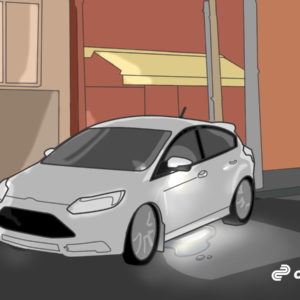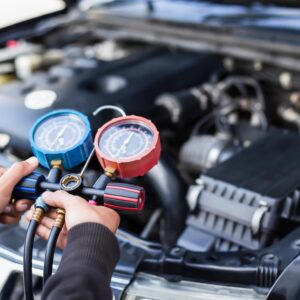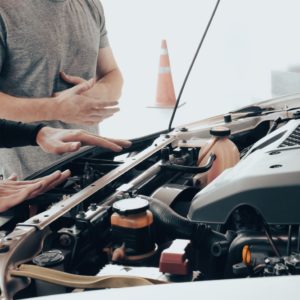Your vehicle’s airbags are meant to deploy during a severe crash. These safety components are meant to reduce the risk of injuries during this type of situation.
But if your airbags deployed during a collision, is the car totaled?
The short answer is no. The longer answer is maybe.
Your car is not automatically considered “totaled” just because the airbags deployed. The deployment only indicates the impact’s severity.
When Do Airbags Deploy?
Airbags deploy during moderate to severe crashes. Automotive manufacturers use airbag sensors to trigger airbag deployment based on specific speed and directional factors.

If your airbag system has a safety belt sensor, the front airbag should deploy when the impact of a crash is equivalent to hitting a solid wall at 10-12 mph. If you’re not wearing your seatbelt, your front airbag will deploy at a higher threshold of around 16 mph.
Meanwhile, side airbags deploy faster than front airbags. Side airbags usually deploy within the first 10 to 20 milliseconds of a side crash, with a threshold as low as eight mph for narrow object crashes, like those involving trees and poles. Side airbags also deploy in certain types of frontal crashes.
Airbag sensors can also use the direction of the collision to determine when the airbags will be deployed. For example, auto manufacturers usually set their sensors to deploy the airbag during a head-on collision.
The exact operation of the airbags depends on how the auto manufacturer configured it. Generally, airbags deploy during severe crashes. Severe crashes often lead to extensive vehicle damage, which is why it’s often assumed that a car is totaled if the airbags are deployed during an accident.
When Is a Car Considered Totaled?
A vehicle is considered totaled when a car insurance company assesses it and decides that the cost to repair the damage costs more than what the vehicle is worth on the market during that time.
Airbags are a huge part of this estimate. U.S. Federal law mandates airbags in new vehicles manufactured after 1999. However, the laws are silent about any requirement to replace deployed airbags. Take that for what it’s worth when deciding whether to fix a vehicle.
Different states can have different formulas for determining whether a car is considered totaled. Here are two common methods used to determine if a car is a total loss or not:
Total Loss Threshold
In this method, a car is considered totaled if the cost of repair is more than the state’s set percentage threshold of the car’s actual cash value. (ACV).
ACV refers to the car’s market value before the accident. Most states set a percentage of 70% to 80% for their total loss formula.
So, for example, if your state’s threshold is set at 70%, and the actual cost of repair is 80% of the ACV, your car will be declared a total loss.
Total Loss Formula
Some states do not set a threshold. They use a formula similar to this:
Cost of Repair + Salvage Value ≥ Actual Cash Value
In this equation, salvage value refers to the estimated value of the vehicle in its current state. So, if you base your assessment on this formula, a car will be considered a total loss if the cost of repair and salvage value is more than the ACV.
What Happens When Your Car Is Totaled?
If the damage is covered by your insurance, the insurance company will pay you your vehicle’s actual cash value. In some cases, your insurance company might replace your totaled car with something equivalent.
Here are your options in case your car is totaled:
Accept Payment From The Insurance Company
The easiest thing to do is to accept the payment given by your insurance company. They’ll usually offer you a cash payment or a replacement vehicle that’s similar to yours.
If you still have a remaining car loan balance, you still have to pay for it. Your insurance company will issue a check to your lender.
If there’s an excess amount after the loan payment is made, you can keep it. However, if the amount the insurance company issued is less than what you owe your car lender, you’ll have to shoulder the remaining balance.
Sell Your Car’s Parts
You can also keep your car, and sell its usable parts if you have a good place to store it while you’re trying to sell the parts. Of course, after you sell the usable parts, few salvage yards will want what’s left of the car unless they simply buy it for scrap. You can target car owners that have the same make and model as your totaled car. Maybe they’re looking for engine or transmission parts that you already have.
Selling the parts can serve as a starting point for saving up to purchase a new car or recovering the investment you’ve lost.
Take It to a Salvage Yard
If you don’t want the hassle of selling individual parts, you can sell your totaled car to a junkyard or salvage yard—especially if it isn’t drivable. Junkyards can have your totaled car hauled away for you, so you won’t have to go through all the hassle all by yourself.
Use Your Totaled Vehicle As a Trade-In
If you’re planning to buy a new car, some dealerships might allow you to use your totaled car as a trade-in vehicle. It’s a good idea to get a professional appraisal of your totaled vehicle if you’re planning to take this route to ensure you’re getting a fair deal.
What Happens When Your Car Is Totaled But Still Drivable?
If your totaled car is still drivable, you can opt to keep it. But before getting it back on the road, make sure to have it checked by a trusted mechanic.
Also, depending on the state where you’re residing, you might have to get a salvage title before you can legally drive your totaled car. It involves getting approval from the Department of Motor Vehicles (DMV). You’ll also have to adhere to the state’s minimum insurance requirements.
You also have the option to donate your totaled car to a non-profit organization. Charities usually accept vehicle donations to support their operations.
Keep Your Air Bag Sensors Operational
The air bag sensor is the component that activates your vehicle’s air bags during a crash. Keeping this part operational is critical to ensure that you and your passengers have the protection of air bags when an accident occurs. However, this part can sometimes require replacement when the vehicle’s air bag warning light illuminates. You shouldn’t delay fixing this issue or else you risk your and your passenger’s safety. Luckily, you don’t have to exert a lot of effort to find an air bag sensor for your vehicle here at CarParts.com.
Searching for the right part can be inconvenient since not all stores may have the right part. Here at CarParts.com, we offer a wide range of air bag sensors for all sorts of vehicle makes and models so you can find one that will fit your vehicle. Simply enter your vehicle’s year, make, and model in our vehicle selector and we’ll display a selection of parts that’ll fit. You don’t have to wait for weeks either because we have strategically located warehouses that guarantee fast shipping.
Enter your vehicle’s details and shop for the air bag sensor that’s right for your vehicle!
Any information provided on this Website is for informational purposes only and is not intended to replace consultation with a professional mechanic. The accuracy and timeliness of the information may change from the time of publication.





















